Best Tips For Keeping Pet Reptiles
Best Tips For Keeping Pet Reptiles
Simply put, reptiles are not low maintenance pets. They often have complex care needs, and giving them a full and happy life will require a lot of attention. However, a real and rewarding bond with your ectothermic buddy is well worth the effort if you can commit to it.
Check-in with Yourself
You will want to familiarize yourself with some of the (subjectively, of course) less favourable elements of reptile ownership. Would you be uncomfortable live-feeding rodents and bugs to your pet? Does skin shedding bother you? Unfortunately, some pet owners don’t realize this until they are dangling a mouse over a tank. We’re not trying to scare you, but preparing yourself for the day-to-day of caring for a reptile is essential for both you and your pet’s comfort and happiness.

Which Reptile is Right for You?
You may already have a specific creature in mind. We all know someone who was obsessed with snakes as a kid. Maybe you’re at the stage of knowing you want a pet reptile, but you’re not sure which one. According to veterinarian Dr. Elisabeth Simone-Freilicher, the easiest pet reptiles for first-time owners are the Leopard Gecko, Bearded Dragon, Ball Python, and Corn Snake. This is due to their less intensive care requirements and penchant for sociability.

Checking Boxes
Once you have chosen your new scaly pal, do some research to answer some logistical questions. You should compile info like: How long do they live? How large might they grow? Is your home a suitable environment for them, and vice versa? For more specific care needs, see below.
Lighting
Cold-blooded reptiles require ultraviolet light, which mimics what they would otherwise obtain from the sun, to stay happy and functional. Purchasing a lamp with UVB bulbs is an absolute necessity. It’s important to remember to swap out bulbs every 12 months. The UV quality diminishes gradually and will become ineffective, even if the bulb appears to be still producing optimum light. Keep cages away from direct sunlight to avoid overheating, especially since you are already providing light and heat artificially.

Temperature and Humidity
Most reptiles are not able to regulate and maintain a consistent internal body temperature. Therefore, the responsibility rests on the owner to provide an environment with appropriate heat and humidity. Find out the ideal temperature for your pet, and supplement their habitat accordingly with heat lamps or similar. In terms of humidity levels, it’s a bit of a “just right” situation. Both too dry and too moist can result in health issues for your pet. Consult a vet or expert if you want to make sure they’re primed for health and success in their habitat.
Food and Nutrition
Though pellets are easier for you as the caretaker, live food is preferable for reptiles. Diet will obviously depend on the kind of reptile you decide on, but the typical regimen consists of some combination of mealworms, roaches, crickets, rodents, and fresh fruit and vegetables. A calcium powder is recommended to supplement your pet’s regular food, and can be dusted on top of their meals. Look into your chosen pet and what is required specifically.

Housekeeping
Make sure your pet’s terrarium has all the fixings. Reptiles are infamous in their talent for escape, so a screen clip, lock, or buckle is recommended to curb surprises. Keep your pet’s habitat clean with regular maintenance and disinfection, as a cage full of salmonella-containing feces can harm you and your family. Reptiles are also vulnerable to skin infections, and can suffer grave consequences from a dirty environment. As mentioned earlier, make sure you know the maximum size of your reptilian friend. You don’t want to be keeping your pet cramped in a too-small cage after an unexpected growth spurt, and constant replacements will hurt them and your pockets.
Ask for Help
There is no shame in it, and your reptile will thank you. Find a veterinarian in your area that specializes in reptiles or exotic animals, and build visits into your routine. Everything is harder the first time, and reptile ownership is no different. Stay educated and up-to-date on care requirements so you and your cold-blooded comrade can keep a loving and harmonious relationship.


Leave a comment